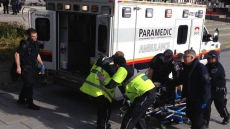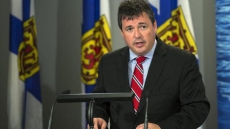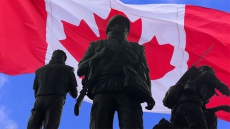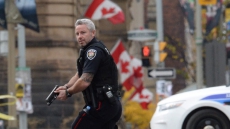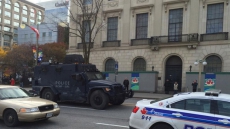TORONTO - The extraordinary events on Parliament Hill on Wednesday had the look of a Hollywood movie or a video game.
But the fatal shooting of a reservist soldier at the National War Memorial and the killing of a gunman in the Centre Block of the nearby Parliamentary complex are starkly real events that will likely be distressing for children, psychologists warn.
They have some advice for parents who may be faced with the troubling task of trying to explain to children actions that are heinous and events that are tragic.
Here are some tips:
TALK AND LISTEN. MAINLY LISTEN.
There is no way to shelter children from this event — they will hear about the attack, says Sandra Mendlowitz, a clinical psychologist in the anxiety disorders program at Toronto's Hospital for Sick Children and an assistant professor of child psychiatry at the University of Toronto.
"These can be very scary moments and you need to talk to your child about what their worries are and what their concerns are. And you need to be truthful, but in a way that is (age) appropriate," she says.
"Find out what they're worried about. Find out what they know. Because sometimes parents assume kids know things that they actually don't know."
Children may be more likely to see the events as having real meaning for them, because they happened in Canada. This is not abstract violence. Children who feel a connection — they live in Ottawa, they have relatives in the Armed Forces, they've visited the Parliament Buildings — may perceive the threat as being more real than something that happens in a far off place.
"The closer you are to it, the more you're going to want to know," says David Wolfe, a psychologist who specializes in issues affecting children and youth at Toronto's Centre for Addiction and Mental Health.
"If it happened where I live or where I've been, then I don't feel safe."
This probably won't be limited to one conversation. Wolfe says you shouldn't force children to keep discussing it if they don't bring it up, but neither should you try to shut down children if they want to keep talking about the events.
"So long as the child is bringing it up, I would want to listen. Because it's something bothering them," he says.
"As long as it's in the news, as long as they are potentially confused and frightened by it, the message basically is 'You're safe here. And if there's anything you're worried about, let's talk about it.'"
GEAR YOUR EXPLANATIONS TO YOUR AUDIENCE
Wolfe says young children are going to be pretty concrete in their thinking and are likely to ask a question like: "Can he come here to my house and shoot me?"
Children who are 10, 11, 12 are at the age where they're starting to realize that the world is a more complex and less safe place than they previously understood. This age group may be very troubled by these events.
"They're the ones that ask the more penetrating questions. And I think this is a really good opportunity for parents to be able listen and talk and reassure and not cover up. And not be false about it and say: 'Oh, don't worry, it's never going to happen to us,'" Wolfe says.
Parents should assure children that they are safe, but will also have to explain — at least to the older ones — that sometimes bad things happen.
TIME YOUR TALK
Don't save these conversations for bedtime, Mendlowitz warns. You'll end up with a child who can't fall asleep.
But do bring the issue up quickly. With the speed of modern communications, kids will be inundated with information about this event almost immediately.
"It has to be a timely response because you're up against all the other sources of information, which is fast. Faster than you can think, that information is on the Internet. So you need to be one step ahead of that," she says.
LIMIT SCREEN TIME
Images and videos of this event are all over the Internet and will lead newscasts for days.
But kids don't need to see this stuff, and especially don't need to see it over and over and over again, Mendlowitz says.
"One of the most important things is that we don't over-expose kids to these images. Especially younger children," she argues. "Little kids don't need to see these things. They really don't."
"It's going to be very difficult to control teenagers. They'll have access to the Internet in any variety of forms. But even then, you have to turn off a lot of this. You don't need to look at graphic images. It is very unsettling for children, adolescents and adults to see this. Because it is real."
BE OBSERVANT
Children may begin behaving differently — acting out, for instance — as they try to process these events, Mendlowitz says. "You need to monitor what's going on and you need to expect that their behaviour may change in response to things that they hear."
She and Wolfe suggest parents watch for signs their kids are having trouble coping with the stress this situation may create. Changes in appetite, mood or sleep patterns are red flags.
Wolfe says boys and girls often respond differently, with the former being uncomfortable talking about their feelings or admitting to being afraid.
